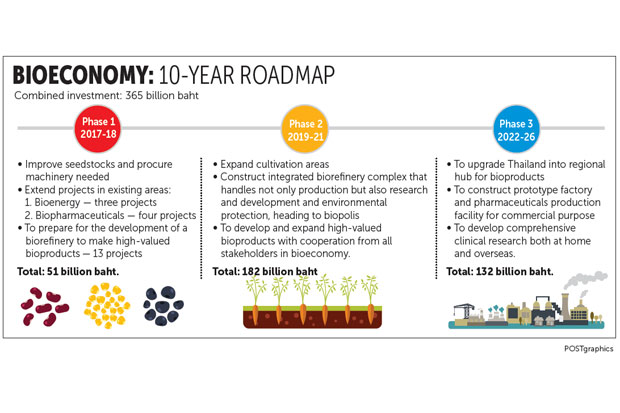
The government and private sector under the Pracha Rat public-private collaborative scheme yesterday launched the bioeconomy development plan to promote more private investment in biotechnology-related businesses.
Twenty-three organisations from government units, the private sector, educational institutes and research centres signed a memorandum of understanding to drive bioeconomy development.
A bio-based economy, bioeconomy or biotechonomy refers to all economic activities derived from scientific and research activity focused on biotechnology.
Prasert Boonsamphan, co-chairman of the Pracha Rat steering committee on bioeconomy, said bioeconomy development will cover five sectors: bioenergy, biochemicals, food, animal feeds and biopharmaceuticals.
The first development will focus on tapioca and sugar cane, where 10 million farmers are engaged in expanding into other farm products such as natural rubber and rice, said Mr Prasert.
Sugar cane and tapioca are now used as raw materials for many industries such as ethanol, bioplastics, food, bioenergy and biopharmaceuticals.
He projects private investment in the 10-year development plan will hit up to 400 billion baht, with added value to sugar cane expected to reach 300 billion and those to tapioca amounting to 100 billion.
Deputy Prime Minister Somkid Jatusripitak said this is the right time to implement such a development plan, saying a bioeconomy will help increase income in the farm sector, which covers half of the Thai population.
"We have to aim high to develop all farm products. All studies should focus more on worldwide demand," he said. "If Singapore can develop Biopolis without having a farm sector, we believe Thailand, which is a production base for agricultural products, can do even better."
Mr Somkid said bioeconomy development should be focused in the Eastern Economic Corridor (EEC) and Khon Kaen province, which is a key location for sugarcane cultivation.
The EEC will run through Chon Buri, Rayong and Chachoengsao. The corridor has been designated for development as a high-tech industry cluster, with an eye towards becoming Asean's leading economic zone for industrial, infrastructure and urban development.
The project is meant to accommodate the 10 targeted industries being promoted as clusters by the government.
Those industries are next-generation cars; smart electronics; affluent, medical and wellness tourism; agriculture and biotechnology; food; robotics for industry; logistics and aviation; biofuels and biochemicals; digital; and medical services.
The corridor will also rely on developments in transport infrastructure.
The EEC is also set to become an Asean water transport hub, linking the Dawei deep-sea port in Myanmar with Sihanoukville in Cambodia and Vung Tau port in Vietnam.
Investors in the EEC will receive privileges, including land leases for 50 years and extensions of 49 years, visa-free grants for the import of skilled labour or executives, special tax perks and financial incentives.
